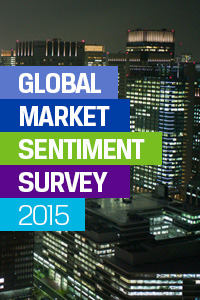Political Instability, Sluggish Developed Economies Drive Wary 2015 Market Outlook
As investors begin to think about closing the books on 2014, they shouldn’t be too optimistic about what 2015 might bring, according to the just-released CFA Institute Global Market Sentiment Survey (GMSS). Tepid global economic growth of 2% and not much more than sideways movement in major equity markets is what’s expected for the coming year, based on the average of predictions of the more than 5,000 CFA Institute members who responded to this year’s survey. By comparison, the World Bank predicts global GDP growth of 3.4% in 2015. (More GMSS survey information on local markets is available here.)
Slow Economic Growth Expected
The underwhelming estimate of economic growth in 2015 reflects members’ mixed views of the economic drivers. The positive factor for global markets most often cited by members was the continuation of accommodative central bank policies. Based on their prediction on average of only a 25 basis point (0.25%) increase in the yield of 30-year US Treasury bonds by the end of 2015, members seem to think the days of easy money from central banks aren’t yet over. But the survey’s respondents indicated concern over continued weakness in developed economies as well as the ongoing effects of political instability across the globe as factors that could drag on global capital markets.
The cautious view of economic prospects spilled over to members’ predictions for some indicative major markets; from the levels as of 30 September 2014 (just prior to the survey period) to the predicted close on 31 December 2015, members see just a 4.8% return on the S&P 500, and only a 1.9% return on the Euro Stoxx 50 and 1.6% return on the Nikkei 225.
Underestimated Risk: Political Instability
Members were also asked to take a slightly longer perspective to consider the most underestimated risk that could negatively impact global markets over the next five years — and political risks (including nationalistic and secessionist movements) were cited by 35% of members, coming in ahead of the challenges of aging populations (selected by 20% of respondents), pension plan shortfalls (14%), and climate risk (8%). Perhaps the fairly constant drumbeat of bad news coming from the Middle East and Ukraine (along with the sparks of unrest in Hong Kong and continuing fractures in US politics) have professional investors considering the possibility of longer-term risks posed by this tumult that haven’t yet been adequately priced in the markets.
More Optimism around Integrity of Financial Markets
The CFA Institute GMSS is unique in that it also asks members to assess the state of financial market integrity, and this year’s survey respondents take a nominally more optimistic view of things, with 28% rating the state of integrity positively, up from 21% in last year’s survey. Market fraud (such as insider trading) and the integrity of financial reporting were the two most-often cited threats to global market integrity, contrasting with respondents’ views of mis-selling as the most-often cited issue relevant to their home market’s integrity.
How to Avoid the Next Financial Crisis: Manage Risk
When asked about what might head off future financial crises, members were optimistic about the potential for better global coordination of systemic risk monitoring, better risk management by bank boards, better risk disclosure, and requiring banks to impair troubled credit holdings on a more consistent and timely basis; two-thirds of respondents expressed the view that each of these could help prevent future financial crises. But 33% of members cited the potential for unintended negative consequences of increasing bank capital and liquidity requirements, as well as designation of nonbank SIFIs (systemically important financial institutions, such as large asset managers or insurance companies) for special regulatory attention.
We’ll be focusing on some of the more interesting results from our members’ local markets in this space in the coming weeks. Let us know what you think: Is 2015 likely to unfold as our members suggest?
If you liked this post, consider subscribing to Market Integrity Insights.

